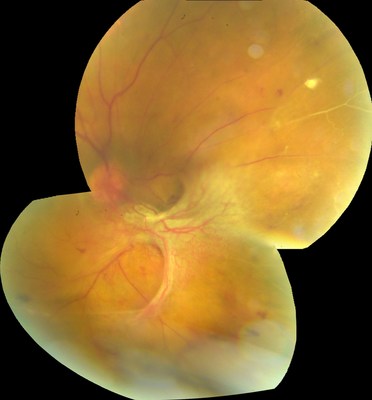Five-Year Clinical Research Study By USC Roski Eye Institute First To Compare Surgical Systems In Diabetic Retinal Detachment Repair
LOS ANGELES, Oct. 3, 2017 /PRNewswire-USNewswire/ -- As the first study to compare three types of surgical systems used in diabetic retinal detachment operations, researchers from the University of Southern California (USC) Roski Eye Institute conducted one of the largest and most comprehensive reviews of both the surgical equipment used and the patient outcomes with findings published in RETINA.

The study was conducted by Hossein Ameri, MD, PhD, of USC Roski Eye Institute and his team of resident and students including Philip Storey, MD, as well his fellow USC ophthalmologists, Mark Humayun, MD, PhD and Damien Rodger, MD, PhD. The research looked at the difference in using a 20-gauge, 23-gauge and 25-gauge vitrectomy system to repair diabetic retinal detachments. Reviewing 400 surgeries performed by USC ophthalmic surgeons at its affiliated hospital, L.A. County+USC Medical Center, over a five-year period, the results found that 90 percent of patients had successful reattachments of the retina and 80 percent had stable or improved visual acuity. In addition, researchers found the newer, smaller 25-gauge system achieved similar success rates to the larger systems.
"Diabetic retinal detachments remain one of the greatest causes of blindness for patients with diabetes," said Ameri. "Our comprehensive study shows excellent surgical outcome for patients with advanced diabetic retinal detachment, but one should always remember that controlling the blood sugar and blood pressure as well as regular eye exams are the best measures to prevent diabetic retinal detachment and blindness."
Retinal detachments are caused anytime subretinal fluid accumulates in the space between the neurosensory retina and the underlying retinal pigment epithelium (RPE). Detachment of the retina may cause permanent blindness and is regarded as a medical emergency. Tractional retinal detachment (TRD), the second most common type of retinal detachment, can occur in advanced stages of diabetic retinopathy (DR), a common complication of diabetes.
According to the National Eye Institute (NEI), an estimated 285 million people have diabetes mellitus worldwide, which is a leading cause of blindness. In the U.S., diabetic retinopathy (DR) is estimated to affect 28.5 percent of the U.S. diabetic population over 40 years oldor approximately 4 percent of the entire U.S. population over 40. This complication is caused by changes in the blood vessels of the retina that may swell and leak fluid. People with all types of diabetes (type 1, type 2 and gestational diabetes) are at risk for DR.
USC Roski Eye Institute Researchers Publish First and Largest Study on Comparison of Surgical Equipment in the Outcome of Diabetic Retinal Detachment Repair 2-2-2-2
Hispanics age 50 and older are at higher risk for developing DR than other ethnic groups. From 2010 to 2050 the number of Americans with DR is expected to double from 7.7 million to 14.6 million with the greatest increase in cases among Hispanics, increasing almost three-fold from 1.2 million to 5.3 million. Early detection through an annual comprehensive eye exam can help prevent the risk of blindness by 95 percent.
A Long History of Affiliation in Medical Care: USC and L.A. County
As part of the Keck Medicine of USC medical enterprise, USC Roski Eye Institute physicians have a longstanding relationship with L.A. County when it comes to medical care. In 1885, the same year the USC College of Medicine was founded, USC forged an affiliation with L.A. County Hospital. In 1968, the Los Angeles County Board of Supervisors voted to change the name of the County Hospital to the Los Angeles County (LAC)+University of Southern California (USC) Medical Center. Keck School of Medicine of USC medical students and residents train under Keck's expert physicians at LAC+USC Medical Center, known as one of the most comprehensive and intensive medical training in the nation with one of the country's busiest Level 1 trauma centers. The USC Roski Eye Institute physicians are the only ophthalmologists seeing patients at LAC+USC Medical Center, training 21 residents and 11 fellows at this facility.
About the USC Roski Eye Institute (usceye.org)
The USC Roski Eye Institute, part of the Keck Medicine of USC university-based medical enterprise, has been a leader in scientific research and innovative clinical treatments for more than 40 years.
Ranked No. 2 in National Eye Institute (NEI) research grants for academically-based ophthalmology departments and nationally ranked in U.S. News & World Report's annual "Best Hospitals" issue for more than 24 years, the USC Roski Eye Institute is headquartered in Los Angeles with clinics in Arcadia, Beverly Hills and Pasadena. Faculty physicians are also the exclusive ophthalmic doctors affiliated with L.A. County + USC Medical Center (LAC+USC) and Children's Hospital Los Angeles (CHLA).
Patients from across the country come to see the USC Roski Eye Institute experts who treat a comprehensive array of eye diseases across the life spectrum from infants to aging seniors. The USC Roski Eye Institute is known for its scientific research and clinical innovation including:
- Creator of the FDA approved Argus retinal prosthesis implant (also known as the "bionic eye") for retinitis pigmentosa patients
- Leader in NEI eye disease research among multi-ethnic populations
- Developer of stem cell therapies for those who have age-related macular degeneration
- Discovered the gene that is the cause of the most common eye cancer in children
- Treatment for eye infections for AIDS patients
- Inventors of the FDA approved XEN stent, the most widely used glaucoma implant in the world
- Pioneers of a device for long-term intraocular drug delivery
- Creator 25 years ago and ongoing leader in OCT research
- Part of the Human Connectome brain mapping research team for eye disease and prevention

View original content with multimedia:http://www.prnewswire.com/news-releases/five-year-clinical-research-study-by-usc-roski-eye-institute-first-to-compare-surgical-systems-in-diabetic-retinal-detachment-repair-300530127.html
SOURCE USC Roski Eye Institute

